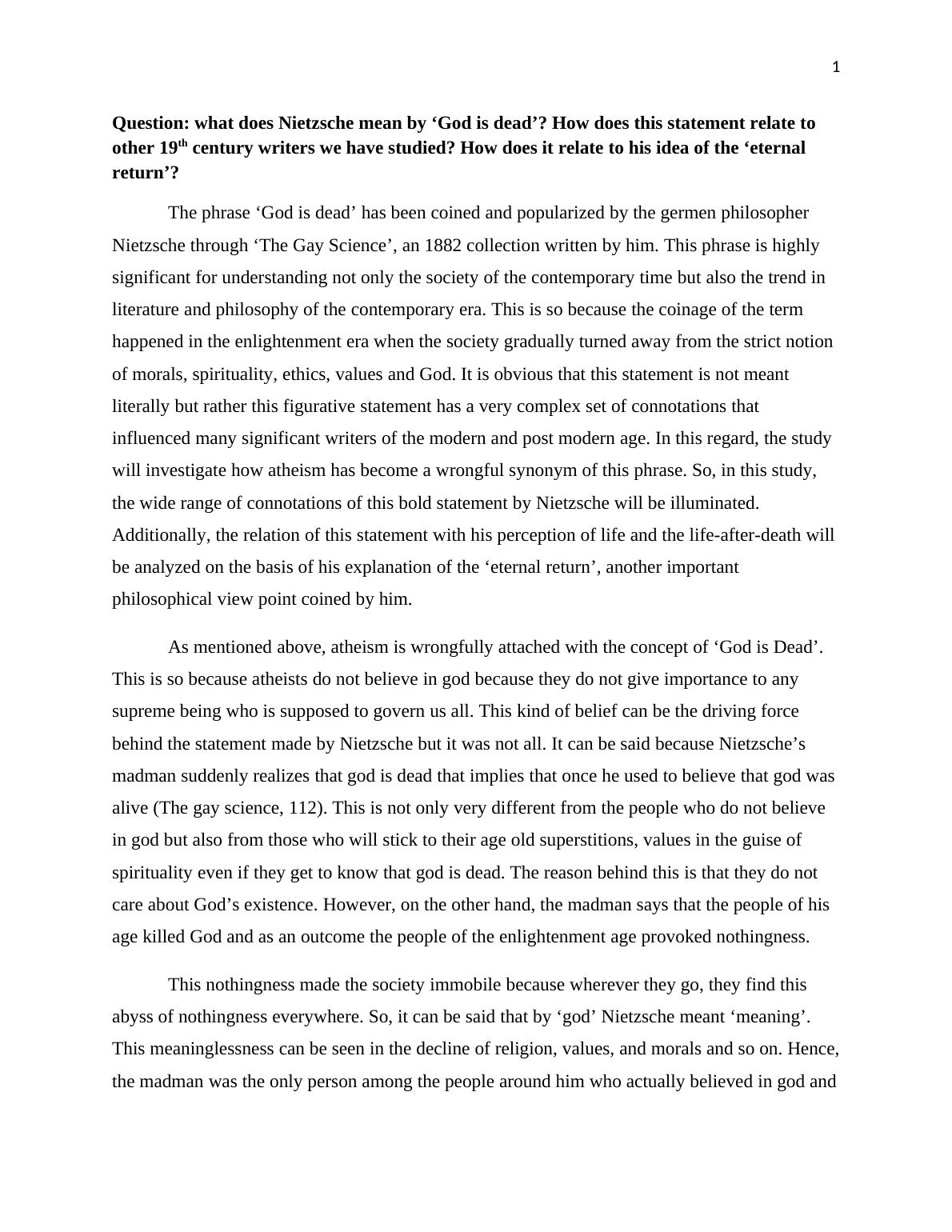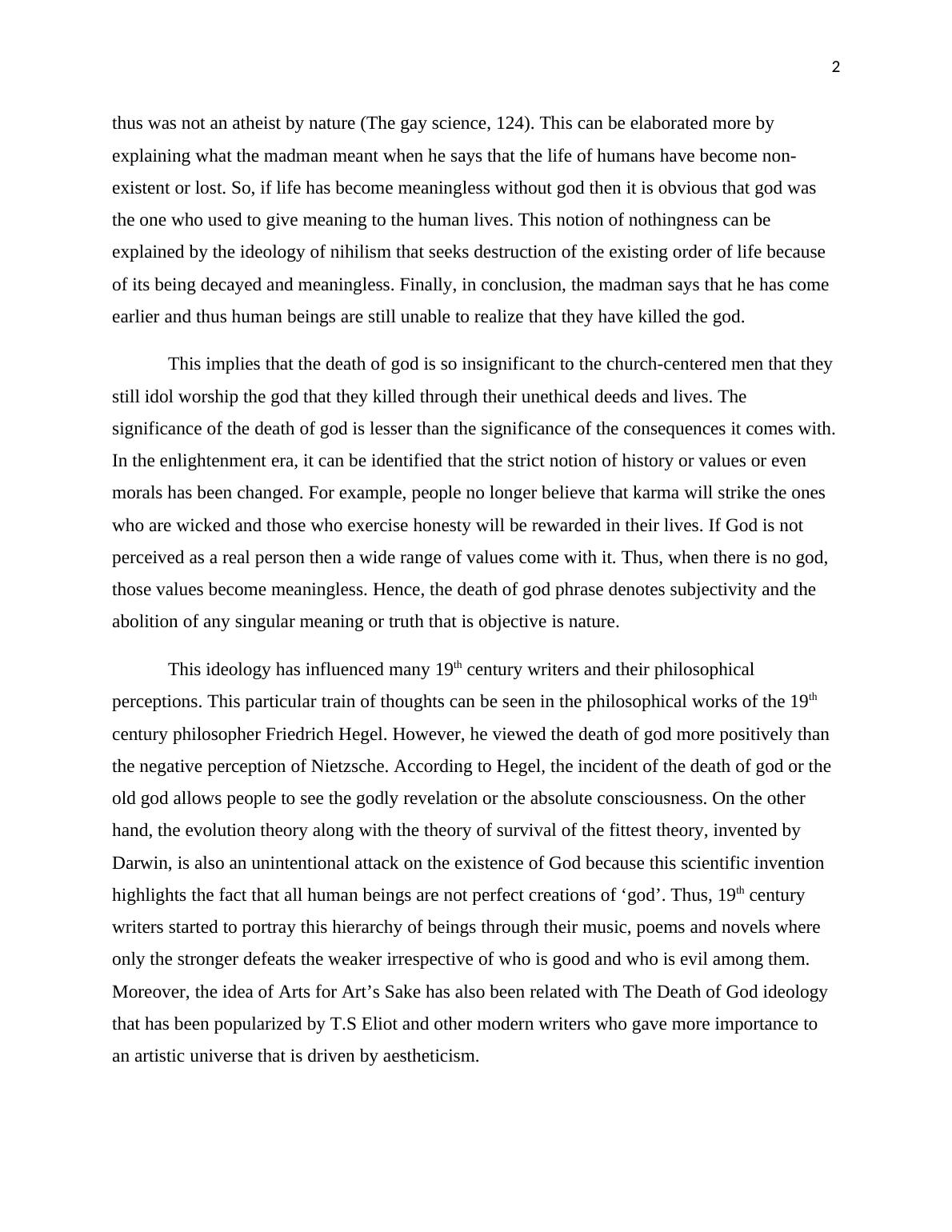Understanding Nietzsche's 'God is Dead' and its Relation to 19th Century Writers
Added on 2023-04-07
4 Pages1311 Words224 Views
1
Question: what does Nietzsche mean by ‘God is dead’? How does this statement relate to
other 19th century writers we have studied? How does it relate to his idea of the ‘eternal
return’?
The phrase ‘God is dead’ has been coined and popularized by the germen philosopher
Nietzsche through ‘The Gay Science’, an 1882 collection written by him. This phrase is highly
significant for understanding not only the society of the contemporary time but also the trend in
literature and philosophy of the contemporary era. This is so because the coinage of the term
happened in the enlightenment era when the society gradually turned away from the strict notion
of morals, spirituality, ethics, values and God. It is obvious that this statement is not meant
literally but rather this figurative statement has a very complex set of connotations that
influenced many significant writers of the modern and post modern age. In this regard, the study
will investigate how atheism has become a wrongful synonym of this phrase. So, in this study,
the wide range of connotations of this bold statement by Nietzsche will be illuminated.
Additionally, the relation of this statement with his perception of life and the life-after-death will
be analyzed on the basis of his explanation of the ‘eternal return’, another important
philosophical view point coined by him.
As mentioned above, atheism is wrongfully attached with the concept of ‘God is Dead’.
This is so because atheists do not believe in god because they do not give importance to any
supreme being who is supposed to govern us all. This kind of belief can be the driving force
behind the statement made by Nietzsche but it was not all. It can be said because Nietzsche’s
madman suddenly realizes that god is dead that implies that once he used to believe that god was
alive (The gay science, 112). This is not only very different from the people who do not believe
in god but also from those who will stick to their age old superstitions, values in the guise of
spirituality even if they get to know that god is dead. The reason behind this is that they do not
care about God’s existence. However, on the other hand, the madman says that the people of his
age killed God and as an outcome the people of the enlightenment age provoked nothingness.
This nothingness made the society immobile because wherever they go, they find this
abyss of nothingness everywhere. So, it can be said that by ‘god’ Nietzsche meant ‘meaning’.
This meaninglessness can be seen in the decline of religion, values, and morals and so on. Hence,
the madman was the only person among the people around him who actually believed in god and
Question: what does Nietzsche mean by ‘God is dead’? How does this statement relate to
other 19th century writers we have studied? How does it relate to his idea of the ‘eternal
return’?
The phrase ‘God is dead’ has been coined and popularized by the germen philosopher
Nietzsche through ‘The Gay Science’, an 1882 collection written by him. This phrase is highly
significant for understanding not only the society of the contemporary time but also the trend in
literature and philosophy of the contemporary era. This is so because the coinage of the term
happened in the enlightenment era when the society gradually turned away from the strict notion
of morals, spirituality, ethics, values and God. It is obvious that this statement is not meant
literally but rather this figurative statement has a very complex set of connotations that
influenced many significant writers of the modern and post modern age. In this regard, the study
will investigate how atheism has become a wrongful synonym of this phrase. So, in this study,
the wide range of connotations of this bold statement by Nietzsche will be illuminated.
Additionally, the relation of this statement with his perception of life and the life-after-death will
be analyzed on the basis of his explanation of the ‘eternal return’, another important
philosophical view point coined by him.
As mentioned above, atheism is wrongfully attached with the concept of ‘God is Dead’.
This is so because atheists do not believe in god because they do not give importance to any
supreme being who is supposed to govern us all. This kind of belief can be the driving force
behind the statement made by Nietzsche but it was not all. It can be said because Nietzsche’s
madman suddenly realizes that god is dead that implies that once he used to believe that god was
alive (The gay science, 112). This is not only very different from the people who do not believe
in god but also from those who will stick to their age old superstitions, values in the guise of
spirituality even if they get to know that god is dead. The reason behind this is that they do not
care about God’s existence. However, on the other hand, the madman says that the people of his
age killed God and as an outcome the people of the enlightenment age provoked nothingness.
This nothingness made the society immobile because wherever they go, they find this
abyss of nothingness everywhere. So, it can be said that by ‘god’ Nietzsche meant ‘meaning’.
This meaninglessness can be seen in the decline of religion, values, and morals and so on. Hence,
the madman was the only person among the people around him who actually believed in god and

2
thus was not an atheist by nature (The gay science, 124). This can be elaborated more by
explaining what the madman meant when he says that the life of humans have become non-
existent or lost. So, if life has become meaningless without god then it is obvious that god was
the one who used to give meaning to the human lives. This notion of nothingness can be
explained by the ideology of nihilism that seeks destruction of the existing order of life because
of its being decayed and meaningless. Finally, in conclusion, the madman says that he has come
earlier and thus human beings are still unable to realize that they have killed the god.
This implies that the death of god is so insignificant to the church-centered men that they
still idol worship the god that they killed through their unethical deeds and lives. The
significance of the death of god is lesser than the significance of the consequences it comes with.
In the enlightenment era, it can be identified that the strict notion of history or values or even
morals has been changed. For example, people no longer believe that karma will strike the ones
who are wicked and those who exercise honesty will be rewarded in their lives. If God is not
perceived as a real person then a wide range of values come with it. Thus, when there is no god,
those values become meaningless. Hence, the death of god phrase denotes subjectivity and the
abolition of any singular meaning or truth that is objective is nature.
This ideology has influenced many 19th century writers and their philosophical
perceptions. This particular train of thoughts can be seen in the philosophical works of the 19th
century philosopher Friedrich Hegel. However, he viewed the death of god more positively than
the negative perception of Nietzsche. According to Hegel, the incident of the death of god or the
old god allows people to see the godly revelation or the absolute consciousness. On the other
hand, the evolution theory along with the theory of survival of the fittest theory, invented by
Darwin, is also an unintentional attack on the existence of God because this scientific invention
highlights the fact that all human beings are not perfect creations of ‘god’. Thus, 19th century
writers started to portray this hierarchy of beings through their music, poems and novels where
only the stronger defeats the weaker irrespective of who is good and who is evil among them.
Moreover, the idea of Arts for Art’s Sake has also been related with The Death of God ideology
that has been popularized by T.S Eliot and other modern writers who gave more importance to
an artistic universe that is driven by aestheticism.
thus was not an atheist by nature (The gay science, 124). This can be elaborated more by
explaining what the madman meant when he says that the life of humans have become non-
existent or lost. So, if life has become meaningless without god then it is obvious that god was
the one who used to give meaning to the human lives. This notion of nothingness can be
explained by the ideology of nihilism that seeks destruction of the existing order of life because
of its being decayed and meaningless. Finally, in conclusion, the madman says that he has come
earlier and thus human beings are still unable to realize that they have killed the god.
This implies that the death of god is so insignificant to the church-centered men that they
still idol worship the god that they killed through their unethical deeds and lives. The
significance of the death of god is lesser than the significance of the consequences it comes with.
In the enlightenment era, it can be identified that the strict notion of history or values or even
morals has been changed. For example, people no longer believe that karma will strike the ones
who are wicked and those who exercise honesty will be rewarded in their lives. If God is not
perceived as a real person then a wide range of values come with it. Thus, when there is no god,
those values become meaningless. Hence, the death of god phrase denotes subjectivity and the
abolition of any singular meaning or truth that is objective is nature.
This ideology has influenced many 19th century writers and their philosophical
perceptions. This particular train of thoughts can be seen in the philosophical works of the 19th
century philosopher Friedrich Hegel. However, he viewed the death of god more positively than
the negative perception of Nietzsche. According to Hegel, the incident of the death of god or the
old god allows people to see the godly revelation or the absolute consciousness. On the other
hand, the evolution theory along with the theory of survival of the fittest theory, invented by
Darwin, is also an unintentional attack on the existence of God because this scientific invention
highlights the fact that all human beings are not perfect creations of ‘god’. Thus, 19th century
writers started to portray this hierarchy of beings through their music, poems and novels where
only the stronger defeats the weaker irrespective of who is good and who is evil among them.
Moreover, the idea of Arts for Art’s Sake has also been related with The Death of God ideology
that has been popularized by T.S Eliot and other modern writers who gave more importance to
an artistic universe that is driven by aestheticism.

End of preview
Want to access all the pages? Upload your documents or become a member.
Related Documents
Short Question/Answer in Philosophylg...
|5
|1155
|70
